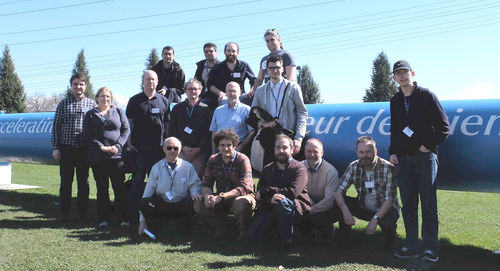OctConf 2017
We are happy to announce the upcoming Octave Conference 2017 to be held at CERN, near Geneva, Switzerland, from March 20th until March 22nd. The Local Organising Committee is happy and proud that CERN will host this event for at least two reasons: Octave [2] is a fundamental tool of analysis and research for hundreds of CERN scientists; Octave and CERN share and promote the same values of openness, cooperation, diversity, quality and commitment.
The three-day event will be an opportunity for sharing experiences, planning the future of Octave and promoting its use among the scientific community and beyond. There will two open sessions on Monday and Tuesday showcasing Octave and some interesting and successful Octave stories. To register officially, please use the CERN conference manager Indico. In addition, *please* add your name to the Participants section of this page so we can plan appropriately.
We are hopeful that the key members of the Octave development team will make it, both from oversea and from Europe. You can find more updated information on the programme in the CERN's OctConf webpage and in here.
Dates: The conference will run for three days from Monday, March 20th through Wednesday, March 22nd.
Location
The upcoming Octconf 2017 will take place at CERN (European Center for Nuclear Research)
At CERN, the European Organization for Nuclear Research, physicists and engineers are probing the fundamental structure of the universe. They use the world's largest and most complex scientific instruments to study the basic constituents of matter – the fundamental particles. The particles are made to collide together at close to the speed of light. The process gives the physicists clues about how the particles interact, and provides insights into the fundamental laws of nature. The instruments used at CERN are purpose-built particle accelerators and detectors. Accelerators boost beams of particles to high energies before the beams are made to collide with each other or with stationary targets. Detectors observe and record the results of these collisions.
Founded in 1954, the CERN laboratory sits astride the Franco-Swiss border near Geneva. It was one of Europe's first joint ventures and now has 22 member states.
Social activities
Two social events have been foreseen, besides the coffee and the lunch breaks:
Suggestions for Sessions
Approximately half of each day will be devoted to presentations. The remainder will be used for informal discussions, code sprints, etc.
Please propose session topics in the schedule below. The actual time slot you pick is not important--we can re-arrange the schedule later--but we need to know what topics are of interest.
In addition, if you have a poster, rather than a full presentation, there is a separate sign-up sheet below.
Schedule
During the daytime: CERN offers many areas where people can socialize and/or discuss, informally. For instance, the CERN main restaurant is open until 23:00 (11:00 PM).
The indico timetable will be used as the official schedule. This one here should mirror that one.
| Time | Monday (General GNU Octave day) |
Tuesday (GNU Octave Packages day) |
Wednesday (Libre and Open Source Software day) |
|---|---|---|---|
| 9:00-9:30 | Registration - IT Amphitheatre Coffee Area, CERN | GSoC project: Exponential Integrators (Chiara Segala) |
Unconference |
| 9:30-9:40 | Welcome to CERN and Conference info | SOCIS project: Improve iterative methods for sparse linear systems (Cristiano Dorigo) |
|
| 9:40-10:10 | Octave for N dimensions and microscope image processing (Carnë Draug / David Miguel Susano Pinto) | Visit to CERN sites | |
| 10:10-10:30 | Octave for Particle Accelerator Performance Optimization (Andrea Latina) |
Discussion and Coffee | |
| 10:30-11:00 | Coffee | ||
| 11:00-11:30 | publish your code with Octave (Kai T. Ohlhus) | Support of free software in public institutions: the KiCad case (Javier Serrano) KiCad demo (Tomasz Wlostowski) |
|
| 11:30-12:00 | Open slot | ||
| 12:00-12:45 | Discussion and Group Photo | GSoC project: ode15{i,s} and The future of the Neural Network package (Francesco Faccio) |
|
12:45-14:00 |
Lunch | Lunch | Lunch |
| 14:00-14:30 | 25 Years of Octave: Recent Developments and Future Directions (John W. Eaton) |
Technical overview of user code parallelization (Olaf Till) | Unconference |
| 14:30-15:00 | 8/16-bit simulation with GNU Octave (Andreas Stahel) | ||
| 15:00-15:30 | Open Slot | Current Status of Octave Forge (Oliver Heimlich) | |
| 15:30-16:00 | Coffee | Coffee | Coffee |
16:00-17:30 |
Code Sprint | Code Sprint | Organization of OctConf2018, Closing, and Farewell |
| 17:30-18:30 | |||
19:30-21:30 |
Fondue night |
Poster Session
If you have a poster demonstrating how you use Octave to address an application in your field please add your name and poster topic to the list below. We will schedule an appropriately sized space based on the number of posters.
Confirmed Posters:
| Title | Author |
|---|---|
| VSDP – A GNU Octave/MATLAB® toolbox for verified semidefinite-quadratic-linear programming | Kai T. Ohlhus |
| Characterization of high-Tc granular superconductors in a magnetic fields | Michele Manzini |
Participants
To register officially, please use the CERN conference manager Indico.
- JuanPi Carbajal
- Francesco Faccio
- John W. Eaton
- Jordi Gutiérrez Hermoso
- Douglas Stewart
- Kai T. Ohlhus
- Oliver Heimlich (Tuesday–Wednesday)
- Carnë Draug
- Andreas Weber
- Valentin Ortega
- Andrea Latina
- Andreas Stahel
- Carlo de Falco
- Cristiano Dorigo
- Michele Ginesi
- Chiara Segala
- Pantxo Diribarne (likely to attend, probably one day only)
- Marco Caliari (arrival in Monday afternoon)
- Anna Ferrarini
- Elisa Frison
- Sara Stillavati
- Olaf Till
- Philip Nienhuis
